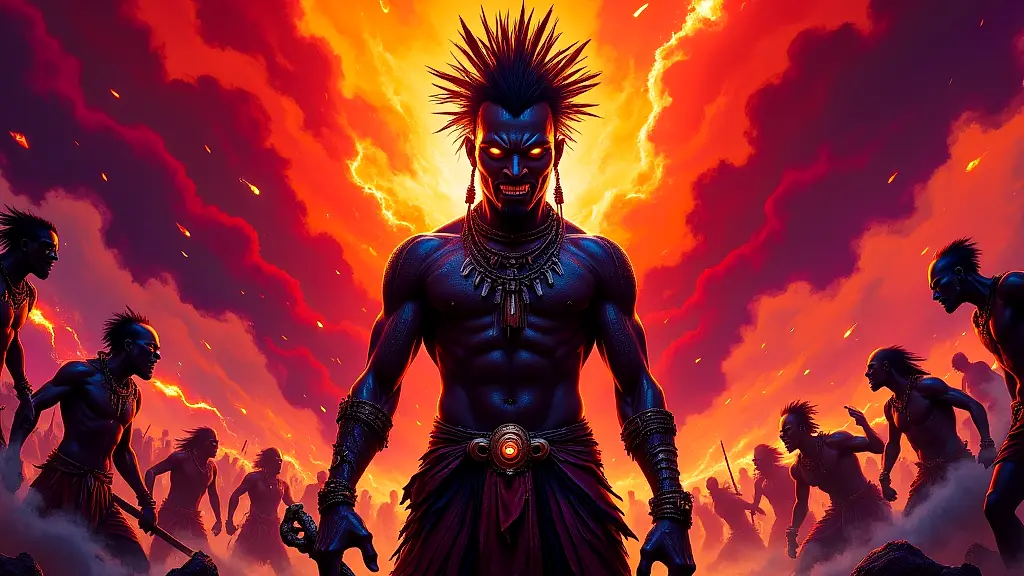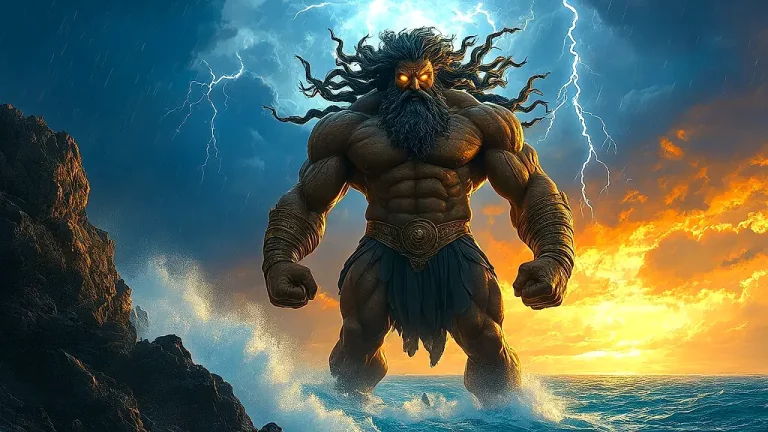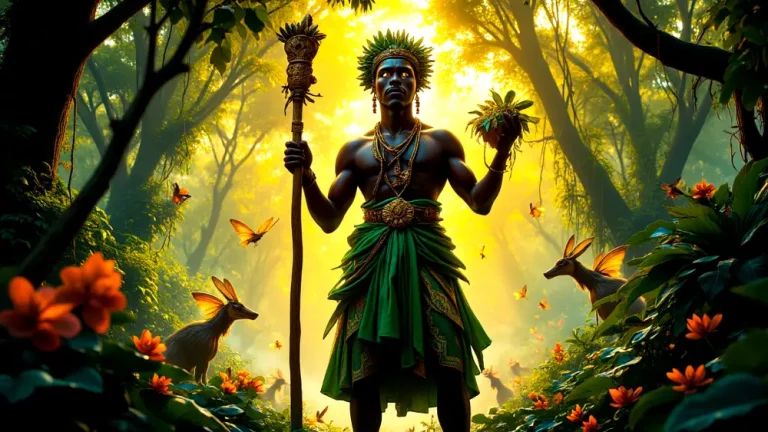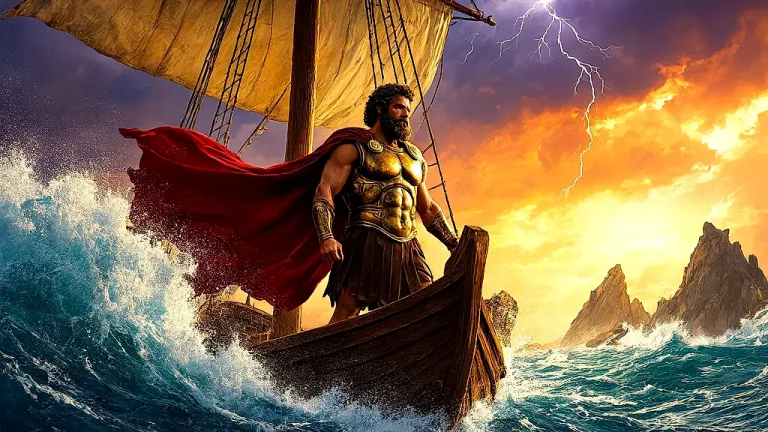Ekwensu: The Igbo Trickster God Of War, Trade, And Chaos
You know those people who flourish in disorder? The ones who turn confusion into something useful? In Igbo mythology, Ekwensu is exactly that – a deity linked to cunning, war, and trade. He doesn’t fit simple labels. Western traditions often see evil as absolute. But Ekwensu is different. He embodies duality, acting as a trickster who causes chaos but also enables change. Fire destroys, but it also creates. Ekwensu works the same way.
Key Points:
- Ekwensu is an Igbo god linked to war, trade, and chaos, acting as a trickster who brings both trouble and change.
- Unlike the Christian Satan, Ekwensu isn’t purely evil but plays a complex role in keeping balance.
- Stories tell how he messed with the Yam Festival, tricked people, and helped shape the world with flaws.
- Warriors called on him for battle skills, making deals that came with strict rules and harsh punishments if broken.
- People honored him with masks, staffs, and ceremonies involving blood, palm wine, and reversed roles during festivals.
- His symbols include red and black colors, twisted designs, and iron tools, all tied to war and unpredictability.
- Different Igbo communities saw him in varied ways, some focusing on his chaos, others on his role in testing order.
We’ll explore his myths. From chaotic yam festivals to creation tales, these stories show how the Igbo people respected him as balance, not just chaos. Even if you don’t know mythology well, or you’ve heard of figures like Loki or Anansi, Ekwensu’s stories reveal something important. In Igbo culture, chaos isn’t just inevitable – it’s sacred. Let’s begin.
Ekwensu: Overview and Key Facts
| Attribute | Description |
|---|---|
| Name Meaning | The name comes from Igbo words: ekwe (“agree”) and nsu (“reject”). This reflects his dual nature – both uniting and dividing. Scholars debate the exact meaning, as regional dialects influence interpretations. |
| Primary Roles | – Trickster: He challenges norms with clever tactics – think of a chess player who bends the rules. – God of War: Warriors called on him for strategy, not just strength. – God of Trade: Guardian of markets and bargaining, embodying commerce’s unpredictability. |
| Symbols | – Staff (Nkpologwu): Represents both authority and disorder. <br> – Masks: Used in rituals to invoke his power. – Red/Black Colors: Linked to war and uncertainty. |
| Cultural View | He isn’t just evil. The Igbo saw him as necessary for balance – creating destruction but also enabling renewal. Different communities see him differently – some focus on his chaos, others on his role in testing order. |
| Comparable Figures | – Loki (Norse): They’re both tricksters, though Ekwensu plays a bigger role in society. – Anansi (Akan): Both are cunning, but Ekwensu has stronger ties to war. |
| Key Traits | – Cunning: He outsmarts enemies and allies alike. – Ambiguity: Neither fully good nor evil. – Adaptability: His role shifts – warrior, trader, or agent of chaos. |
(Note: Some traits, like Ekwensu’s link to trade, are debated by historians due to limited pre-colonial records.)
Who is Ekwensu?
Understanding Ekwensu completely requires careful study. We need to examine his dual roles in Igbo spirituality and how he differs from familiar figures like Satan.
Ekwensu in Igbo Beliefs
In Igbo cosmology, Ekwensu functions as a multifaceted deity fulfilling three main roles: the trickster, the warrior, and the merchant. As a trickster, he actively questions traditions by exposing contradictions through clever strategies. Warriors who invoked Ekwensu sought more than physical power – they needed his tactical wisdom to transform disadvantages into victories. Traders recognized his volatile influence in marketplaces, representing commerce’s uncertainties through both gains and sudden losses.
Ekwensu’s nature reveals three defining characteristics that govern his relationships with humans and deities:
- Cunning Intelligence: He consistently outmaneuvers opponents and allies alike, demonstrating superior strategic thinking
- Controlled Chaos: His disruptions serve specific purposes, forcing necessary change rather than creating disorder without purpose
- Dual Nature: Balancing creative and destructive capacities, he embodies the Igbo concept of “Nne na Nna” – complementary opposing forces
Different communities emphasize various aspects of Ekwensu. Some focus primarily on his warrior qualities, while others stress his role in preserving equilibrium through intentional disruption.
Ekwensu acts as a tricky, battle-ready, and business-savvy god who shakes things up on purpose to keep balance while mixing smarts, chaos, and both good and bad sides.
Ekwensu and Christian Satan Side by Side
Colonial interpretations frequently linked Ekwensu with the Christian Satan, but they actually embody distinct concepts in their original traditions. Ekwensu functions as an ethically complex agent of change within Igbo spirituality, initiating transformation through calculated disruption. The Christian Satan represents absolute wickedness in mainstream theology, existing solely to oppose divine will and corrupt humanity.
This comparison table outlines their key differences:
| Aspect | Ekwensu | Christian Satan |
|---|---|---|
| Moral Alignment | Variable (both helpful and disruptive) | Purely evil (opposed to divine will) |
| Cosmic Role | Catalyst for balance and evolution | Eternal adversary of God |
| Cultural Perception | Respected as a necessary element | Widely condemned as corruptive |
| Origins | Primordial deity in Igbo tradition | Fallen angel in Abrahamic texts |
| Relationship with Humans | Occasionally invoked for benefit | Consistently seeks human ruin |
These contrasts reveal fundamental differences between the religious systems. Christianity maintains a strict good-versus-evil dichotomy, while Igbo spirituality accommodates moral complexity. Researchers have documented how early missionary comparisons distorted indigenous beliefs, though modern studies now provide more accurate understandings of Ekwensu’s original role.
Tales and Legends About Ekwensu
We understand Ekwensu’s complex nature best through stories passed down through generations. These include three key tales that reveal his different aspects:
The Story of Ekwensu and the Yam Festival
One well-known tale tells how Ekwensu interfered with the sacred New Yam Festival, one of the most important annual events in traditional Igbo society. When villagers were preparing their best yams and palm wine offerings for the earth goddess Ala, Ekwensu arrived disguised as a village elder. He convinced them their harvest was cursed unless they performed new rituals.
While the distracted villagers danced exhaustively, Ekwensu took all the offerings, leaving only empty containers behind – a carefully planned act that left everyone confused.
This story shows important aspects of Ekwensu’s role:
- Exposes weaknesses in uncritical following of customs
- Provides benefits as the missing offerings later improved the soil for a better harvest
- Maintains balance by showing traditions sometimes need reconsideration
Different regions tell slightly varied versions. Some say Ekwensu returned the offerings after making his point, while others claim the event permanently changed festival practices. Through this action, Ekwensu demonstrated that excessive rigidity can be counterproductive, just as complete lack of structure creates problems.
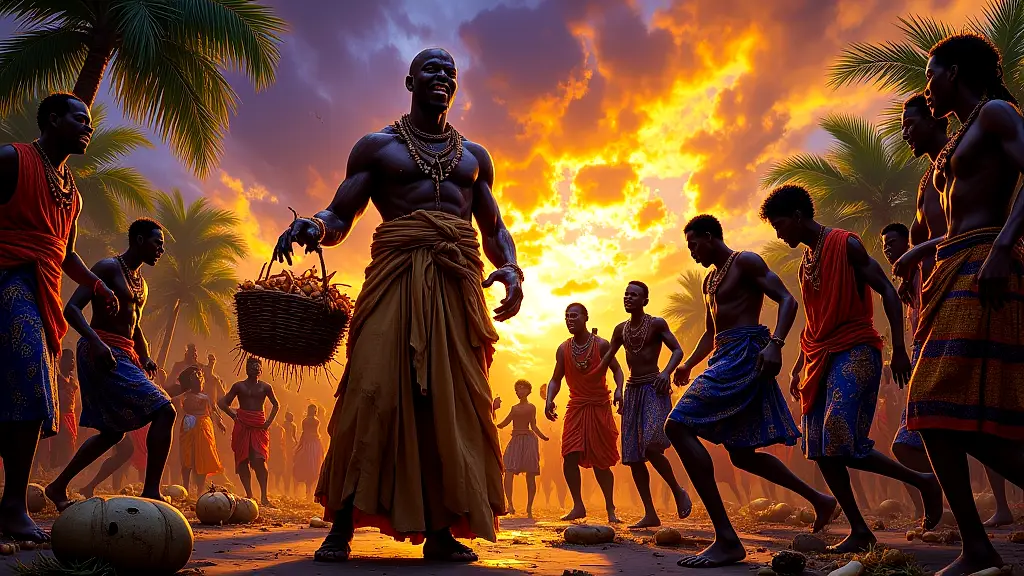
Ekwensu’s Part in Creating the World
In Igbo creation stories, Ekwensu had an unconventional but vital role. When Chukwu first formed the world from chaos, Ekwensu introduced deliberate imperfections. He created stars by cracking the sky’s surface, shaped hills and valleys by roughening the earth, and gave humans free will by planting doubts. These actions served as divine adjustments that improved creation. Different Igbo communities remember these events differently.
Anambra traditions say Ekwensu spilled the “water of life” to form rivers and rain patterns. According to Nri accounts, he established death’s necessity, arguing existence required endings to have meaning. This mirrors how resistance serves necessary purposes in natural systems. Ekwensu’s creative role stands out because he simultaneously assisted and challenged Chukwu. Unlike the Christian Satan who opposes God, Ekwensu’s disruptions ultimately supported the divine plan.
Researchers believe these myths reflect early understandings of ecological balance, where apparent disorder often maintains stability. The Igbo core belief holds that true balance requires dynamic tension rather than perfect harmony.

Ekwensu and the Warrior’s Promise
Igbo warriors seeking battle advantages performed intense rituals to channel Ekwensu’s power. These preparations involved spending seven nights in the “evil forest,” where participants drank mixtures made with bitter herbs and sacrificial animal parts while reciting war chants. 19th century Nsukka warriors left detailed records showing these exact requirements:
- Make a blood pact: Cut a cross-shaped mark on the tongue with a bronze razor
- Complete a spiritual fast: Avoid salt, women, and daylight for one moon cycle
- Learn the war chant: Memorize the complete “Ogu Ekwensu” invocation
- Follow strict taboos: Never retreat from battle, harm spiders (Ekwensu’s messengers), or disclose the rituals
Breaking these vows risked severe consequences. Warriors who failed their promises reportedly suffered Ekwensu’s revenge, either going mad or suddenly being wounded in combat. However, unlike Western demon pacts where the demon always collects payment, Ekwensu only punished those who broke their word. This reflected the Igbo value of personal honor.
Some clan versions added harder tests, like surviving a night tied to a leopard-haunted iroko tree to prove they’d gained Ekwensu’s fearlessness.
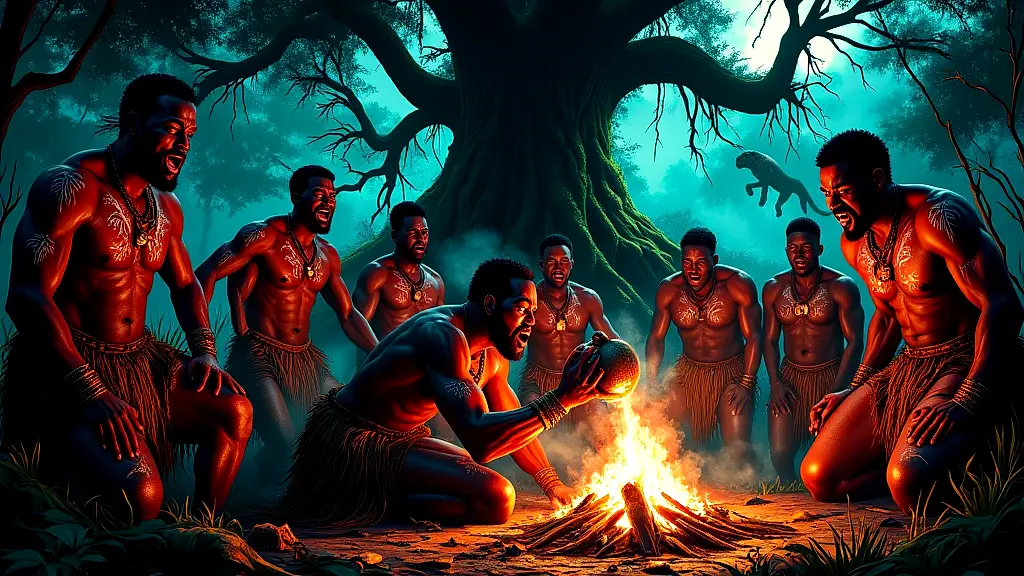
What Ekwensu Represents and How He Was Honored
Ekwensu remains important because of the sacred objects and rituals dedicated to him. These show how communities actually worshipped this powerful deity. Here’s how people physically honored him in daily practice.
Sacred Objects Linked to Ekwensu
The most notable Ekwensu artifacts were the ritual masks used in warrior initiations. These distinctive wooden masks had iron teeth and were carved from iroko wood. They featured uneven designs with one smooth side showing order and one jagged side representing chaos. Existing examples demonstrate consistent use of red ochre pigment, which researchers connect with blood sacrifices.
The hollow eye sockets allowed wearers to detect deception in battle. Only specially trained priests could make these masks, which were kept hidden except during certain ceremonies. Another important artifact was Ekwensu’s ceremonial staff. These iron rods had spiral patterns indicating uncertain directions, with decorative tops shaped like twisted snakes or broken spears.
Warriors carried them in battle as both weapons and spiritual tools, believing the iron conducted Ekwensu’s power. Diviners used smaller versions with cowrie shells that rattled during readings, thought to be Ekwensu speaking. When not in use, people stored all staffs upside down to prevent uncontrolled chaos from spreading.
Ekwensu’s ritual masks and staffs were powerful objects used in war and ceremonies, with masks revealing truth in battle and staffs channeling chaos when held upright.
Ceremonies and Gifts for Ekwensu
The most important Ekwensu rituals happened during the new moon. Priests led processions to sacred groves carrying iron pots of palm wine and baskets of blackened kolanuts. At the ceremony’s peak, they sacrificed a black rooster by twisting its neck counterclockwise to match Ekwensu’s chaotic nature. The blood was caught in special iron bowls and splashed on carved wooden posts that stood for the deity.
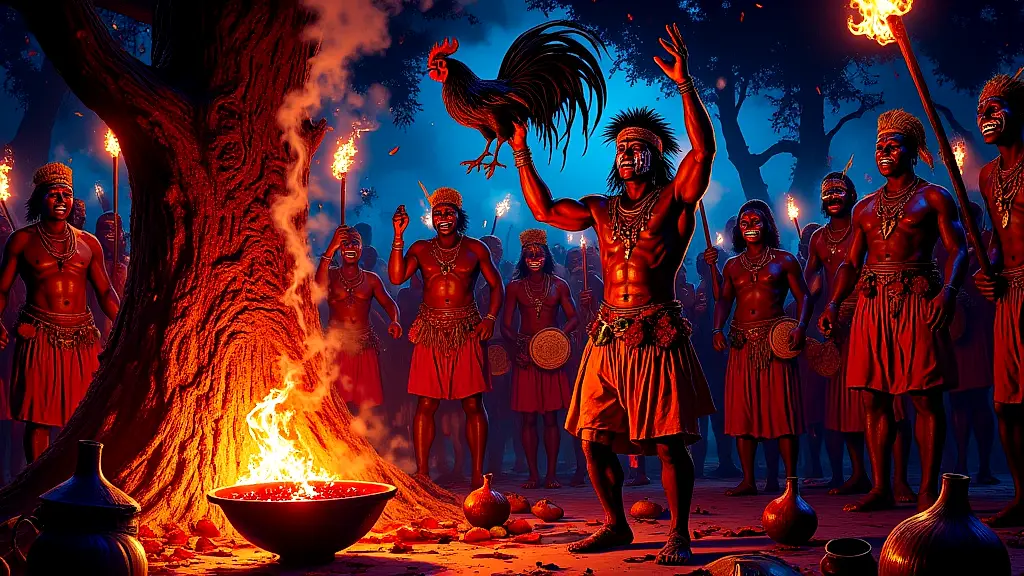
People then drank palm wine mixed with a drop of blood, creating what’s known as a sacred agreement with Ekwensu’s power. Another key ceremony came during the yam harvest. Communities held special events where normal rules were reversed. Masked dancers imitated Ekwensu by joking with elders, while women dressed as warriors and children made demands. These festivals always included throwing empty gourds against stone altars while shouting requests.
Diviners studied the broken pieces to predict the next year’s events.
Common offerings to Ekwensu included:
- Iron tools (often broken) showing changed conflicts
- Bitter kola nuts representing life’s difficulties
- Red cloth bundles holding personal protection items
- Spiral-shaped pottery copying Ekwensu’s twisting ways
Warriors made special gifts before battles. They would wrap a weapon in red cloth and leave it at crossroads overnight. If priests took it by morning, this meant Ekwensu accepted it. These rituals had to happen at night because Ekwensu was linked with darkness and the unknown. Daylight ceremonies were seen as deeply disrespectful.
The Pantheon of African Mythology Gods
Ekwensu is part of a large group of African gods and spirits. These include the Yoruba Orishas and the Akan Abosom, covering different parts of human life and nature. If you want to learn more about these traditions, check out this detailed list of all the African Gods that includes hundreds of deities from across the continent’s diverse cultures.
FAQs
1. Is Ekwensu evil?
Is Ekwensu evil depends on context, as Igbo tradition views him as a neutral trickster embodying chaos and duality rather than absolute malevolence.
2. How is Ekwensu different from Loki or Anansi?
Ekwensu differs from Loki or Anansi by embodying war and strategic chaos, whereas Loki thrives on betrayal and mischief, and Anansi symbolizes wisdom through storytelling.
3. Are there modern temples for Ekwensu?
Modern temples for Ekwensu are rare, as traditional Igbo worship has largely diminished, though some practitioners still honor him in personal or communal rituals.
4. What lessons do Ekwensu’s myths teach?
The lessons Ekwensu’s myths teach revolve around the necessity of chaos for balance, the power of cunning, and the duality of order and disruption.

